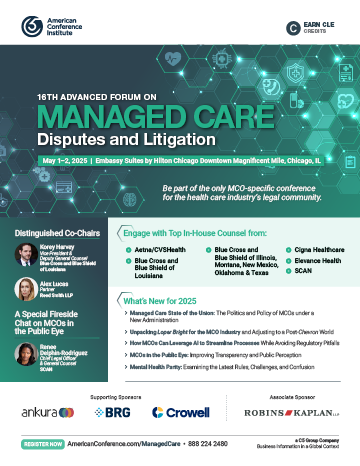Agenda

Flip through our conference brochure and discover what’s new this year.
Download Brochure
Day 1
May 1, 2025
Networking Breakfast and Registration

Helaine FingoldMember of the Firm Epstein Becker & Green, P.C.

Michael MaddiganOffice Managing Partner, Litigation, Arbitration, and Employment Hogan Lovells

Jonathan HermanManaging MemberHerman Law Firm
Assessing the first 100 days of the Trump administration, our panelists examine the actions taken thus far and discuss what they expect to come down the pipeline in the next hundred days and beyond.
Some of the themes to be explored include:
- Examining what Trump 2.0 means for Medicare and Medicaid programs
- Anticipating the impact on the regulatory landscape
- Assessing what the agency nominations and appointments could portend for future action

Thomas BarkerPartnerFoley Hoag LLP

Xavier BakerPrincipalGroom Law

Jennifer SokolerPartner O’Melveny & Myers LLP

Adam PeltzmanDeputy General Counsel, Executive Director Blue Cross Blue Shield Association
In June 2024, the Supreme Court overturned 40 years of precedent in its decision in Loper Bright Enterprises v. Raimondo. The decision overruled the established Chevon deference, which had directed courts to defer to an agency’s reasonable interpretation of any ambiguity in a law under that agency’s jurisdiction. We are just beginning to feel the effects of this ruling and will likely be dealing with the fallout for years to come. In this session, we will explore the immediate aftershocks and examine the road ahead, covering topics such as:
- Overview of the Supreme Court ruling in Loper Bright Enterprises v. Raimondo that upended 40 years of precedent and fundamentally changed our understanding of the Administrative Procedure Act
- Analyzing the immediate fallout of this decision and discussing what challenges have thus far been brought against previously established rules and regulations
- Investigating what the decision and its fallout could mean for guidance and rules issued to clarify and bolster the Inflation Reduction Act, Affordable Care Act, Antikickback Statute, Mental Health Parity and more
- Anticipating and preparing for ongoing and forthcoming disputes
- Exploring which jurisdictions are likely to be more or less friendly to existing statute and government interpretation
Extended Networking Break
Ready or Not Here AI Comes: How Can MCOs Use Artificial Intelligence to Streamline Processes While Avoiding Regulatory Pitfalls

Linn FreedmanPartner Robinson & Cole LLP

Lindsay KnutsonDirector Berkeley Research Group
- Defining and distinguishing artificial intelligence from other advanced digital tools
- Assessing how AI is currently supporting the efficient management of complex tasks in health plan administration
- Deciphering the latest regulation, legislation, and guidance around the use of AI and emerging technologies in healthcare
- Understanding what we have learned over the past year and examining the pain points as MCOs implement artificial intelligence
- Examining how MCOs have gone about successfully employing technology in processes for MCOs without running afoul of the latest regulations
- Analyzing litigation and court rulings establishing precedent or scope of AI
- Assessing litigation risk based on what we’ve learned about AI usage
- Overseeing third party use of AI
Networking Luncheon

Dorothy DeAngelisSenior Managing Director Ankura

Melissa WongPartnerHolland & Knight LLP
Join us for a conversation on the use of artificial intelligence in care determinations. During this panel, we will explore:
- Determining how big a role AI should play in the claim authorization process
- Examining pending litigation around the use of AI and algorithms in the prior authorizations
- Interpreting the latest guidance from CMS and other government agencies
Analyzing the Aftermath of Change Healthcare Cyberattack: Top Takeaways for MCOs One Year Post Breach

David BaileyVice PresidentClearwater Security

Reena BajowalaShareholderGreenberg Traurig, LLP
- Overview of Change incident
- Impact on healthcare industry
- Update on what has happened in response a year later
- Vendor breaches and risk mitigation
- Federal regulator notifications (SEC, HIPAA)
- Litigation update
Networking Break
Okay, Maybe a Few Surprises: An Analysis of Activity Surrounding the No Surprises Act After Texas Medical

Alex LucasPartnerReed Smith LLP

Adam PetittPartnerRobinson & Cole LLP

Ray WalkerManaging Counsel – LitigationBlue Cross and Blue Shield of Illinois, Montana, New Mexico, Oklahoma & Texas
- Analyzing the latest decision by the 5th Circuit Court of Appeals upholding a district court ruling vacating QPA instructions
- Predicting the next cause of action in the protracted battle between payors and providers surrounding the NSA
- Exploring the latest developments in the IDR process
- When should providers bring actions to enforce the IDR award?
- Peeling back the veil on the arbitration process
- Breaking down the arguments most often made in these cases and revealing the most successful and unsuccessful tactics
- Dissecting the fallout from the Texas Medical decisions
- What guidance can be expected from the CMS following the Texas Medical decision
‘Ask an Arbitrator’ Returns: Reviewing Realtime Questions on Arbitration Dos, Don’ts and Best Practices

Kirstin IvesCo-FounderFalkenberg Ives LLP

Christopher Keele, Esq.Mediator and ArbitratorJAMS

Michelle SkipperNational Healthcare Vice PresidentAmerican Arbitration Association
International Centre for Dispute Resolution
In addition to its role in the IDR process under the No Surprises Act, arbitration plays a part in countless MCO disputes. Back by popular demand, this interactive panel, our experts will answer all the questions you’ve been afraid to ask! Topics will include:
- Understanding how the arbitration selection process works
- What is in-house counsel looking for? What is firm counsel looking for?
- What are the pros and cons to arbitrations with just one arbitrator versus an arbitration panel?
- Determining which disputes belong in arbitration and which belong in court
- Providing guidance around the true finality of an arbitration decision
Day 1 Concludes to Networking Cocktail Reception
Sponsored by:
Day 2
May 2, 2025
Networking Breakfast and Registration

Melissa BartlettSenior Vice President, Health PolicyThe ERISA Industry Committee (ERIC)

Kathryn CohenSenior Director, Regulatory Affairs Association for Behavioral Health and Wellness

Joseph LaskaPartnerHernandez Laska LLP

Jennafer TryckSenior Litigation AttorneyGibson, Dunn & Crutcher LLP
In September 2024, the government issued “Final Rules under the MHPAEA,” strengthening federal laws on mental health parity requirements. As of January 1, plans cannot use NQTLs for mental health and substance use disorder benefits that are more restrictive than the predominant NQTLs as compared to medical and surgical benefits. In this session, we will dig deeper into the new rules and explore topics such as:
- Dissecting the new final rules from HHS, DOL, and Treasury and analyzing the early results from their implementation
- Interpreting how mental health, substance abuse, gender-affirming care, and other MHPAEA priorities are being evaluated
- Discussing the latest enforcement priorities under the new administration
- Understanding what the available guidance says and figuring out how to comply
- Providing updates from litigation in the 5th, 9th, and 10th Circuit courts
- Ryan S. v. UnitedHealth Group and E.W. v. Health Net Life Insurance Co.
- Examining Circuit courts findings on pleading standards in MHPAEA cases
- Assessing how mental health, substance abuse, gender-affirming care, and other MHPAEA priorities are being evaluated in view of recent cases
Networking Break

Taylor FlemingAssistant General Counsel Florida Blue

Timothy RibelinPartner Husch Blackwell LLP

Michael ShaheenPartnerCrowell & Moring LLP
- Analyzing the latest litigation, particularly cases on the 2nd and 9th Circuits
- Examining the Justice Department’s action against Independent Health and DxID for fraud towards the Medicare Advantage program
- Deciphering the last year of shifting fraud and abuse enforcement priorities and regulatory guidance pertaining to MCOs

Nathaniel MoorePartnerRobins Kaplan LLP

Daniel LyonsManaging Senior Counsel, Legal DepartmentAetna/CVSHealth

Kaelan NagleManaging DirectorAnkura
- Exploring the role of internal Special Investigations Units (SIUs) in addressing fraud and abuse
- Examining how the volume of cases with law enforcement is leading to a more active SIUs
- Identifying opportunities for the SIU to work with in house legal teams and outside counsel more effectively
- Detailing the impact of resourcing and different in-house structures on investigations
- Supporting defensive legal efforts with SIU leads
- Exploring perspectives on when to bring outside counsel into the investigation
- Assessing the value of having outside involved early to vet leads
- Determining whether to risk mitigate or pursue a lead
- Analyzing recent trends in fraud and billing schemes uncovered by SIUs
- How do SIU findings parallel government investigations into the healthcare industry?
- Examining litigation trends
- Plan sponsor plaintiffs
- Pushback on pre-payment review
Networking Luncheon
A New World of MCO Integration? Examining Potential Shifts in Antitrust Enforcement Priorities Under the New Administration

Ami ElShareifCounsel, Litigation and Investigations Humana

Anna PletcherPartnerO’Melveny & Myers LLP

Megan WolfPartnerCrowell and Moring LLP
- Evaluating the healthcare antitrust landscape
- How much direct competition is required to invite antitrust scrutiny from the authorities?
- What specific items are government agencies looking at when considering whether to further scrutinize a deal?
- Analyzing the premerger filing and clearance statutes in various states across the country
- Examining ongoing litigation as well as recent court decisions
- What can we glean from the ongoing Federal Trade Commission v. U.S. Anesthesia Partners case
- How closely are you going to be watching Oregon Association of Hospitals and Health Systems v. State of Oregon, a challenge to a new state law strictly regulating health care mergers
- Discussing the important of being extremely meticulous in all company communications when discussing any possible deal
- Dissecting new types of vertical integration and how they are being scrutinized (i.e. clearinghouses, pharmacy benefits, etc…)
Star-Crossed: Examining the Latest Litigation Stemming from the Drop Star Ratings for Medicare Advantage Plans

Tyler MarshallDirectorBerkeley Research Group

Oren RosenthalDeputy General Counsel SCAN Group & SCAN Health Plan
Over the last few years CMS has changed the methodology it uses to calculate MA plan star ratings. These changes have made it more difficult for plans to achieve ratings that will result in quality bonus payments. Plans have been steadily, and successfully launching lawsuits against CMS, in response.
- Analyzing the latest in litigation and fallout from Medicare Advantage star ratings system lawsuits
- Elevance Health v. Xavier Becerra resulted in a partial win for Elevance Health, ruling HHS violated the Administrative Procedure Act
- Centene, UnitedHealth, and Humana lawsuits against the HHS aiming to challenge their star ratings
- Determining when to litigate over low star ratings
- Projecting potential reforms by CMS to address industry concerns over the current star ratings methodology
Networking Break

Richard DavisPartner Quarles & Brady LLP

Rochelle-Leigh (Shelley) RosenbergPartner Crowell & Moring LLP
- Examining the latest updates around the 340B Program and how they factor into government sponsored MCO plans
- Overview of CMS’ 340B remedy rule for payment cuts
- Examining how this will impact existing contracts between MA plans and 340b hospitals
- Anticipating future impacts on MA rates
- Analyzing how the latest HHS rules on the 340B Administration Dispute Resolution process are being put into practice
- Updating the latest litigation following AHA v. Becerra
- Following Eli Lilly and Company v. U.S. Department of Health and Human Services, challenging enforcement and regulatory actions requiring manufacturers to offer discounted prescription drugs to contract pharmacies
- Dissecting recent and ongoing disputes and preparing for the next round of litigation

Devin CohenPartnerRopes & Gray LLP

Paul WellerPartner, Health Care Litigation Group Robins Kaplan LLP
While private equity is not an entirely new entrant into the healthcare space, increased scrutiny and oversight across the managed care industry has led many to question how big a role PE should have in healthcare. This session will cover:
- Examining recent legislative, and regulatory developments impacting private equity in healthcare
- Understanding why Governor Newsom vetoed a bill that would have required PE funds and hedge funds to obtain consent before entering in healthcare transactions
- Examining proposed legislation in Pennsylvania that aims to impose notification requirements on healthcare facilities, systems or providers engaging in certain healthcare transactions
- Stalled legislation in Connecticut, Massachusetts, Minnesota, and Oregon
- Assessing whether scrutiny over private equity in healthcare will be as stringent under the Trump administration
- Anticipating potential shifts in FTC enforcement priorities and what this could me for private equity firms exploring opportunities in healthcare
- Investigating how private equity firms are impacting providers and their relationships with MCOs
- Pinpointing where disputes could bubble up

